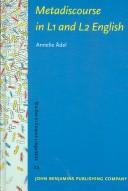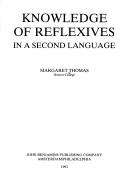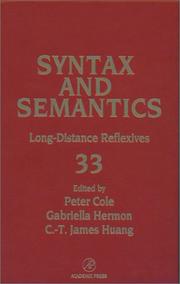| Listing 1 - 6 of 6 |
Sort by
|

ISBN: 9027222975 9789027222978 9789027293299 9027293295 1282155415 9786612155413 Year: 2006 Publisher: Amsterdam ; Philadelphia : John Benjamins Pub. Co.,
Abstract | Keywords | Export | Availability | Bookmark
 Loading...
Loading...Choose an application
- Reference Manager
- EndNote
- RefWorks (Direct export to RefWorks)
The pervasive phenomenon of metadiscourse - commentary on the ongoing discourse - is beginning to take its rightful place among the major topics of discourse studies. This book makes simultaneous contributions to the theory of metadiscourse, corpus-based methods of studying such phenomena, and our knowledge of metadiscourse use in written English. After comprehensively reviewing previous research, it introduces a more rigorous and empirical approach to metadiscourse studies. Ädel presents a new model of metadiscourse based on Jakobson's functions of language, and other conceptual tools, including explicit features for defining metadiscourse, a taxonomy of the functions it serves, and maps of the boundaries between it and related phenomena. A large-scale study of writing by L1 and L2 university students is presented, in which the L2 speakers' overuse of metadiscourse strongly marks them as lacking in communicative competence. This work is of interest both to linguists and to educators concerned with writing in English.
English language --- Grammar, Comparative and general --- Discourse analysis. --- Reflexives. --- Reflexives (Grammar) --- Reflexivity (Grammar) --- Reflexivization (Grammar) --- Pronoun --- Reciprocals --- Verb --- Linguistics --- Philology --- Germanic languages
Book

ISBN: 1283396629 9786613396624 3110199149 9783110199147 9781283396622 9783110195941 3110195941 6613396621 Year: 2008 Publisher: Berlin Boston
Abstract | Keywords | Export | Availability | Bookmark
 Loading...
Loading...Choose an application
- Reference Manager
- EndNote
- RefWorks (Direct export to RefWorks)
This collection of original papers is a representative survey of recent theoretical and cross-linguistic work on reciprocity and reflexivity. Its most remarkable feature is its combination of formal approaches, case studies on individual languages and broad typological surveys in one volume, showing that the interaction of formal approaches to grammar and typology may lead to new insights and results for both fields. Among the major issues addressed in this volume are the following: How can our current knowledge about the space and limits of variation in the relevant domain be captured in a structural typology of reciprocity? What light can such a typology shed on the facts of particular languages or groups of languages (e.g. Austronesian)? How can recent descriptive and typological insights be incorporated into a revised and more adequate version of the Binding Theory? How do verbal semantics, argument structure and reciprocal markers interact? How can we explain the pervasive patterns of ambiguity observable in these two domains, especially the use of the same forms both as reflexive and reciprocal markers? What are the major sources in the historical development of reciprocal markers? This combination of large-scale typological surveys with in-depth studies of particular languages provides new answers to old questions and raises important new questions for future research.
Grammar, Comparative and general --- Reflexives (Grammar) --- Reflexivity (Grammar) --- Reflexivization (Grammar) --- Reciprocals (Grammar) --- Reciprocals. --- Reflexives. --- Pronoun --- Reciprocals --- Verb --- Reflexives --- Linguistics --- Philology --- Linguistic Typology.
Book
ISBN: 3110919710 9783110919714 Year: 2017 Publisher: Berlin ; Boston : De Gruyter,
Abstract | Keywords | Export | Availability | Bookmark
 Loading...
Loading...Choose an application
- Reference Manager
- EndNote
- RefWorks (Direct export to RefWorks)
Das Verbalgenus Medium ebenso wie die in vielen europäischen Sprachen vorliegenden Reflexivkonstruktionen unterscheiden sich von anderen Diathesen darin, daß sie verschiedene Lesarten aufweisen können: reflexiv (sich waschen), reziprok (sich treffen), dekausativ (sich biegen), kausativ reflexiv (sich die Haare schneiden [lassen]) oder facilitativ (Das Buch liest sich leicht). In der Arbeit wird eine einheitliche Analyse für alle Lesarten des Mediums vorgestellt, bei der diese sich nicht durch eine Veränderung der semantischen Repräsentation ergeben, sondern aus der Interaktion der Argumentstruktur (AS) mit der Verbsemantik und der Ereignisstruktur. Die zentrale Annahme ist, daß die Eigenschaft, das Zustandekommen der Situation zu kontrollieren, nicht mit dem semantisch als Agens festgelegten Argument assoziiert ist, sondern mit der höchsten AS-Position. Charakteristisch für Mediumformen ist, daß das Agensargument nicht in die AS abgebildet wird, so daß diese Eigenschaft entweder mit einem anderen Argument assoziiert wird, oder die Situation als nicht von einem ihrer Partizipanten verursacht interpretiert werden kann. Berücksichtigt werden das Mediumssystem im Fula, Alt- und Neugriechischen sowie Reflexivkonstruktionen u.a. im Deutschen und Spanischen. Da die passivische Lesart nach der vorgestellten Analyse nicht zu den genuinen Mediumlesarten gehört, liegt ein Schwerpunkt auf ihrer Entstehung im Altgriechischen und den daraus resultierenden Veränderungen des Verbsystems.
Grammar, Comparative and general --- Verb --- Reflexives (Grammar) --- Reflexivity (Grammar) --- Reflexivization (Grammar) --- Reflexives. --- Verb. --- Verb phrase --- Verbals --- Reflexives --- Pronoun --- Reciprocals --- Linguistics --- Philology
Book
ISBN: 9789027205940 9789027273673 9027273677 9027205949 1280690216 9786613667151 9781280690211 6613667153 Year: 2012 Volume: 127 Publisher: Amsterdam Benjamins
Abstract | Keywords | Export | Availability | Bookmark
 Loading...
Loading...Choose an application
- Reference Manager
- EndNote
- RefWorks (Direct export to RefWorks)
While French reflexive clitics have been widely studied, other forms of expressing co-reference within the clause have not received much attention. This monograph offers a diachronic study of the wider system of clause-mate co-reference in French, including the stressed pronouns, their suffixed form {soi/lui/elle}-même, and also the intensifier use of the latter. Its empirical backbone is a corpus analysis of the gradual replacement of stressed reflexive soi with the personal pronoun lui/elle from Old to Modern French. Apart from offering insights into the history of the l
French language --- Historical linguistics --- Grammar --- Grammar, Comparative and general --- Reflexives. --- History. --- Langue d'oïl --- Romance languages --- Reflexives (Grammar) --- Reflexivity (Grammar) --- Reflexivization (Grammar) --- Pronoun --- Reciprocals --- Verb --- Linguistics --- Philology --- Français (langue) --- Grammaire comparée --- Histoire --- Constructions réfléchies (linguistique) --- Français (langue) --- Grammaire comparée --- Constructions réfléchies (linguistique)

ISBN: 9027224692 9786613280220 9027281769 1283280221 Year: 1993 Volume: 6 Publisher: Amsterdam Benjamins
Abstract | Keywords | Export | Availability | Bookmark
 Loading...
Loading...Choose an application
- Reference Manager
- EndNote
- RefWorks (Direct export to RefWorks)
This study addresses the debate about whether adult language learners have access to the principles and parameters of universal grammar in constructing the grammar of a second language. The data are based on two related experiments. The first examines the interpretation of English reflexive pronouns by native speakers of Japanese and of Spanish. The second experiment examines the interpretation of the Japanese reflexive zibun by native speakers of English and of Chinese. Three hypotheses are evaluated: (a) that UG is unavailable, and that processing strategies or other non-linguistic
Aanleren van een tweede taal --- Anafoor (Taalwetenschap) --- Anaphora (Linguistics) --- Anaphore (Linguistique) --- Apprentissage d'une deuxième langue --- Deuxième langue [Apprentissage d'une ] --- Second language acquisition --- Tweede taal [Aanleren van een ] --- Grammar, Comparative and general --- -Second language acquisition --- Second language learning --- Language acquisition --- Cross-reference (Linguistics) --- Linguistics --- Reference (Linguistics) --- Comparative grammar --- Grammar --- Grammar, Philosophical --- Grammar, Universal --- Language and languages --- Philosophical grammar --- Philology --- Reflexives --- Grammar, Comparative --- Reflexives (Grammar) --- Reflexivity (Grammar) --- Reflexivization (Grammar) --- Pronoun --- Reciprocals --- Verb --- Grammar [Comparative and general ] --- Second language acquisition. --- Reflexives.

ISBN: 0126135339 1849508747 058549228X 9780585492285 9781849508742 9780126135336 Year: 2001 Volume: 33 Publisher: San Diego (Calif.): Academic press
Abstract | Keywords | Export | Availability | Bookmark
 Loading...
Loading...Choose an application
- Reference Manager
- EndNote
- RefWorks (Direct export to RefWorks)
This new volume serves to focus and clarify the debate surrounding long-distance reflexives by examining the role of syntax, semantics, and pragmatics/discourse in the use of long-distance reflexives in a variety of languages. Graduate students, upper class undergraduates, theoretical linguists, computational linguists, psycholinguists, and linguists at large will find this an important tool. Syntacticians, as well as specialists in language acquisition and processing, will find the volume central to their work. The book is also of great value to those interested in Asian languages, especially Chinese. It will serve as primary reading material for seminars on anaphora. Among its key features, it: discusses a broad range of questions about syntactic categories; and presents a number of theoretical frameworks.
Grammar --- Pragmatics --- Grammar, Comparative and general --- Government-binding theory (Linguistics) --- Constructions réfléchies (Linguistique) --- Théorie du liage et du gouvernement (Linguistique) --- Reflexives --- Anaphora (Linguistics) --- -Comparative grammar --- Grammar, Philosophical --- Grammar, Universal --- Language and languages --- Philosophical grammar --- Linguistics --- Philology --- Binding theory (Linguistics) --- Government and binding (Linguistics) --- Generative grammar --- Cross-reference (Linguistics) --- Reference (Linguistics) --- Grammar, Comparative --- -Reflexives --- -Binding theory (Linguistics) --- Comparative grammar --- Constructions réfléchies (Linguistique) --- Théorie du liage et du gouvernement (Linguistique) --- Reflexives (Grammar) --- Reflexivity (Grammar) --- Reflexivization (Grammar) --- Pronoun --- Reciprocals --- Verb --- Grammar, syntax. --- Language Arts & Disciplines --- Medical --- Reflexives. --- Grammar & Punctuation. --- Audiology & Speech Pathology.
| Listing 1 - 6 of 6 |
Sort by
|

 Search
Search Feedback
Feedback About UniCat
About UniCat  Help
Help News
News